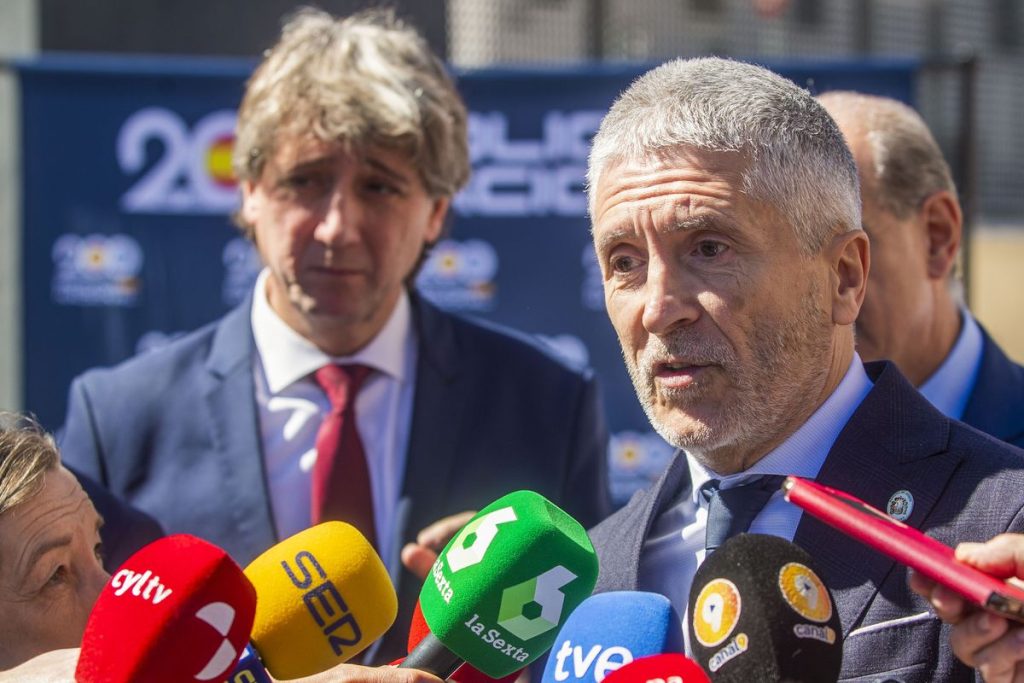A masked figure holding an assault rifle against a red background featuring images of the four football stadiums in London, Paris, and Madrid, where Champions League quarter-final matches are scheduled to take place, is accompanied by a threat: “Kill them all.” This threat, disseminated in recent days through internet platforms by the jihadist groups Al-Azaim Foundation and Sarh al-Khilafah, has prompted the Ministry of the Interior to issue “security reinforcement orders” for the Real Madrid-Manchester City and Atletico Madrid-Borussia Dortmund matches in the capital. This increase in security measures includes a higher number of counter-terrorism agents deployed to ensure the safety of the matches, as confirmed by police sources. The operation will involve over 2,000 agents, primarily from the National Police, with the addition of Civil Guards and officers from the Madrid Municipal Police.
Since 2015, Spain has been on a level 4 antiterrorism alert, which is considered a “high risk” level out of the five existing levels. A previous anti-jihadist security reinforcement operation concluded on April 2 due to the celebration of Easter, and similar measures have been in place in Spain and other European countries since October following the conflict between Israel and Hamas in Gaza. Counter-terrorism sources point out that threats against major sports events like the Champions League matches are part of a broader campaign to target gatherings of people with significant media coverage. The goal is to instill fear and tension while possibly inciting individuals who have been radicalized to commit violent acts. The recent Islamist attack at the Crocus City Hall near Moscow, claimed by an ISIS branch and resulting in over 130 deaths, is seen as aiding these groups in their objectives. This is not the first instance of jihadists using sporting events to issue threats, as seen during the 2018 World Cup in Russia where ISIS-affiliated platforms engaged in propaganda activities without any actual terrorist incidents occurring.
Manuel R. Torres, a Political Science professor at the University Pablo Olavide in Seville and an expert on jihadism, believes that the recent threats against the Champions League matches are orchestrated by two organizations, the Al-Azaim Foundation and Sarh al-Khilafah, without direct ties to ISIS or its media arm. Torres suggests that sometimes these platforms are operated by just one individual. He points out that ISIS does not bother to deny any association with these groups because it serves their strategy of instilling fear. He predicts that campaigns of this nature will escalate in the lead-up to events like the upcoming Olympics in Paris. These threats are designed to attract media attention and generate fear among the public.
The current situation highlights the potential security risks associated with large-scale events, particularly those in close proximity. The response from authorities is focused on enhancing security measures to prevent any potential threats and ensure the safety of participants and spectators at these matches. The ongoing vigilance and coordination among law enforcement agencies are crucial to effectively address these security challenges and mitigate the risks posed by extremist groups. The need to stay alert and proactive in countering terrorism remains paramount, especially in the face of evolving tactics used by terrorist organizations to sow fear and disrupt public events. The collective efforts of security forces and intelligence agencies are essential in safeguarding public safety and maintaining peace and stability in the face of such threats.


